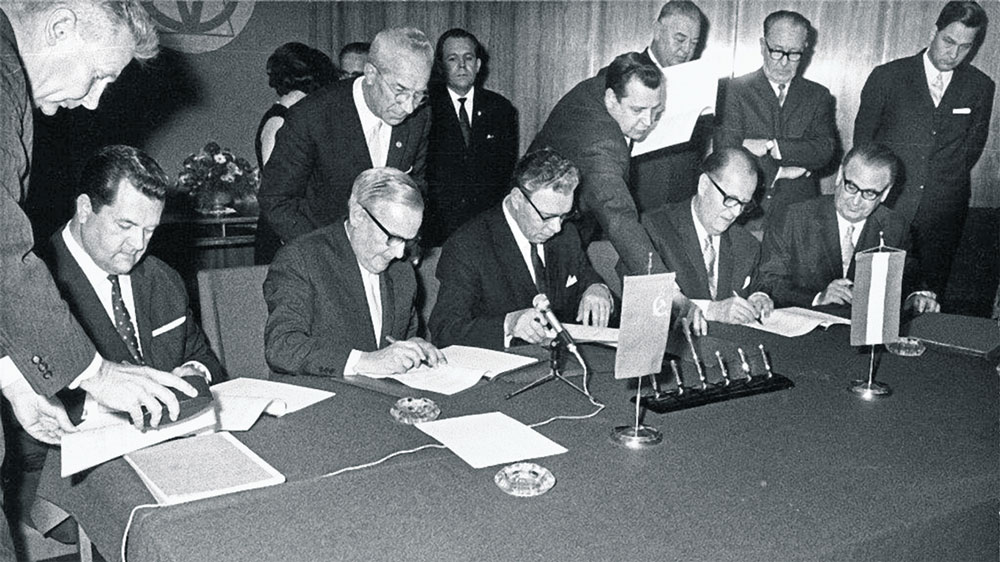Celebrating 50 years of Russian gas supplies to Austria
Gazprom and OMV extend their contract until 2040
This year OMV and Gazprom celebrate 50 years of supplies of Russian gas to Austria. According to the OMV Group’s press release, fifty years ago, on June 1, 1968, the Soviet company Soyuznefteexport and Österreichische Mineralölverwaltung (ÖMV) signed an agreement for supplying natural gas from the USSR to Austria. In a mere three months, gas from Western Siberia reached the Baumgarten station.
The Republic of Austria became the first country in Western Europe to sign a gas contract with the Soviet Union. The initial amount of annual gas supplies – 142 million cubic meters – grew more than 64-fold in 50 years. Today, Austria is a major buyer of Russian gas. In 2017, exports reached a record 9.1 billion cubic meters, with over 218 billion cubic meters delivered to Austria since 1968.
“The strategic partnership of Gazprom and OMV is built on a robust foundation of the 50-year cooperation between our countries in the gas sector. We continue to work towards strengthening and advancing this relationship while meeting Europe’s growing demand for natural gas. We plan to reach a new level of strategic cooperation in the near future,” said Alexey Miller, Chairman of the Gazprom Management Committee.
“In the past 50 years we have received reliable gas supplies from Russia and have been able to provide our industrial and household customers with high quality natural gas without interruption. This is a good base for expanding the partnership with Gazprom long term,” Rainer Seele, Chairman of the Executive Board of OMV, affirmed.
To mark the 50-year anniversary, Gazprom and OMV supported the ‘Old Masters from the Hermitage’ exhibition in Vienna’s Kunsthistorisches Museum, where the world’s best artworks will be presented. In autumn the exhibition will move to the State Hermitage Museum in St. Petersburg.
Gazprom and OMV ink a new agreement
On June 5, Alexey Miller, Chairman of the Gazprom Management Committee, and Rainer Seele, Chairman of the Executive Board of OMV, signed in Vienna an Agreement to extend until 2040 the existing contract between Gazprom Export and OMV Gas Marketing & Trading GmbH for Russian gas supplies to Austria. The contract was valid until 2028.
The document was signed in the presence of Vladimir Putin, President of the Russian Federation, and Sebastian Kurz, Federal Chancellor of Austria, as part of the celebrations marking 50 years of supplies of Russian gas to Austria.
“The Agreement signed today is yet another testament to the growing need for gas imports both in Austria and Europe in general – the need that Gazprom is ready to satisfy. By implementing the construction project for the Nord Stream 2 gas pipeline, we will make gas deliveries even more reliable for the benefit of consumers,” said Alexey Miller.
“By 2030, the European Union will have to import more than 80 per cent of the needed natural gas. By extending this gas supply contract, we will provide Austria and other European countries with natural gas despite the increase in demand. Moreover, it will allow us to reduce CO2 emissions,” Rainer Seele pointed out.
Gazprom’s visit to Vienna also included meetings of Alexey Miller with Elisabeth Koestinger, Austrian Minister for Sustainability and Tourism, and Margarete Schramboeck, Minister for Digital and Economic Affairs.
The gas cooperation became the overarching theme of the meetings, as the parties discussed the importance of natural gas – the cleanest fossil fuel – in Austria’s energy mix, of which it accounted for about 23 per cent.
It was noted that Gazprom had established itself as a reliable gas exporter attuned to the needs of the Austrian market and always ready to meet the rapidly growing consumer demand for natural gas.
Special emphasis was placed on the Nord Stream 2 project. The participants in the meetings pointed out that the efforts to build new gas transmission capacities, such as a new gas pipeline stretching across the Baltic Sea, took on great significance amid the decline in indigenous production in Europe.






